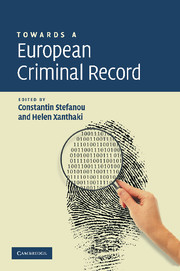Book contents
- Frontmatter
- Contents
- List of contributors
- Preface and acknowledgements
- 1 Introduction: How did the idea of a European Criminal Record come about?
- PART I
- PART II
- PART III
- 16 Databases in the area of freedom, security and justice: Lessons for the centralisation of records and their maximum exchange
- 17 A European criminal records database: An integrated model
- 18 The European Criminal Record: Feasible or folly?
- 19 Conclusions
- Index
17 - A European criminal records database: An integrated model
Published online by Cambridge University Press: 13 July 2009
- Frontmatter
- Contents
- List of contributors
- Preface and acknowledgements
- 1 Introduction: How did the idea of a European Criminal Record come about?
- PART I
- PART II
- PART III
- 16 Databases in the area of freedom, security and justice: Lessons for the centralisation of records and their maximum exchange
- 17 A European criminal records database: An integrated model
- 18 The European Criminal Record: Feasible or folly?
- 19 Conclusions
- Index
Summary
Introduction
The growth of cross-border crime and the progress in the ability to fight the phenomenon has made the exchange of information between judicial and enforcement authorities of Member States increase in importance during the past decade. The term ‘exchange of information’ is used here in its widest sense, referring to the events happening before, during and after sentencing a person who committed a criminal offence. Broadly speaking, the exchange of information becomes evident in four stages.
Firstly, before passing judgment, exchanging information is very important in the context of tracing and arresting an individual suspected of committing a criminal offence. Predominantly law enforcement authorities will be involved in the trading of data necessary in order to locate, and subsequently arrest the required person. Secondly, the extradition of the person concerned, with a view to prosecuting him, will entail the sending and receiving of information between, mainly, judicial and to a lesser extent law enforcement authorities of the states involved. The actual prosecution of the offender in a specific state can, as a third possible moment of exchanging information between states' authorities, cause the need for receiving data from foreign – primarily judicial – authorities in the context of international recidivism and the individualisation of sanctions. Fourthly, after judgment has been passed in a specific case, the possibility of international recidivism by the convicted offender can again require the exchange of information on previous convictions by predominantly judicial authorities.
- Type
- Chapter
- Information
- Towards a European Criminal Record , pp. 336 - 353Publisher: Cambridge University PressPrint publication year: 2008



